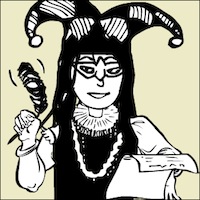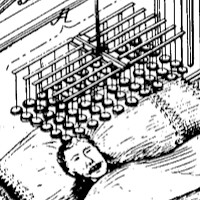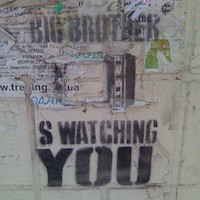Freddie Mercury of Queen

On September 5th, 1946 the incredibly talented Freddie Mercury (real name: Farrokh Bulsara) was born and the world of rock and roll would never be the same.
Freddie Mercury was born in Zanzibar (now part of Tanzania), where he lived with his mother, father and younger sister. He attended a boarding school in Bombay where his talent for the piano was first noticed. Friends commented that he could hear anything on the radio, and turn around and play it on the piano.
When Freddie was 17 the family was forced to flee Zanzibar due to the Zanzibar Revolution in 1964. It was then that the family wound up in London, England, where Mercury lived the rest of his life as a British citizen. It was here that he began trying to put together a band.
There were a few false starts: Ibex, Wreckage, and Sour Milk Sea. Then in 1970, Mercury hooked up with guitarist Brian May and drummer Roger Taylor and the magic was born – Queen.
It has often been noted that Queen’s music is extremely eclectic. Although definitely rock and roll, beyond that it is hard to categorize. The band was as talented with ballads as it was with disco. When you consider Mercury’s influences, though, it is easy to understand. He was inspired by Elvis, the Beatles, Liza Minnelli (particularly praising her role in “Cabaret”), the Who, Led Zeppelin, and Jimi Hendrix. In a (rare) interview in 1986 Mercury is quoted as saying, “I hate doing the same thing again and again and again. I like to see what’s happening now in music, film and theatre, and incorporate all of those things.”
Then there is the magic of Mercury’s voice. With a vocal range of four octaves, he is the envy of even opera singers. He had no formal vocal training; he just claimed to have fun singing, and he put everything into his songs. He could jump from a deep-throated baritone to a glass-cracking falsetto within the same stanza.
Queen’s concerts were no less impressive. Coming into their own at the beginning of the hard rock movement, Queen was giving concerts at the same time as the colorful makeup bands like KISS, Ozzie Osbourne, and Alice Cooper. Given Mercury’s love of theatre, this was not a problem to compete with. Outlandish costumes, stage tricks, playing to the audience – this was Freddie Mercury’s place to shine. Queen often performed to sold-out stadium audiences around the world.
Offstage, however, Mercury was an incredibly private person, staying out of the limelight. This has actually earned him a lot of criticism over the years. Many people felt that he should have been more “open” about being gay and having HIV and AIDS.
In fact, Mercury denied having AIDS for many months, despite looking increasingly ill. Finally, on November 23, 1991, he issued this statement:
“Following the enormous conjecture in the press over the last two weeks, I wish to confirm that I have been tested HIV positive and have AIDS. I felt it correct to keep this information private to date to protect the privacy of those around me. However, the time has come now for my friends and fans around the world to know the truth and I hope that everyone will join with my doctors and all those worldwide in the fight against this terrible disease. My privacy has always been very special to me and I am famous for my lack of interviews. Please understand this policy will continue.”
He passed away the next day at the age of 45 from bronchial pneumonia resulting from AIDS.
Although he may not have actively done anything to highlight HIV and AIDS while he was living and suffered from it, his death cast a huge spotlight on this disease. In 1992 the remaining members of Queen founded the Mercury Phoenix Trust, a charity which raises money for various AIDS charities. The first major fundraiser was the Freddie Mercury Tribute Concert for AIDS Awareness.It played to a live audience of 72,000 and was broadcast to 76 countries with an estimated audience of 1 billion.
It is hard to believe (still) that this man with such a voice full of life is no longer with us. We can only be thankful that we have so many of his recordings to remind us of the magic that was Freddie Mercury.
Freddie Mercury was born in Zanzibar (now part of Tanzania), where he lived with his mother, father and younger sister. He attended a boarding school in Bombay where his talent for the piano was first noticed. Friends commented that he could hear anything on the radio, and turn around and play it on the piano.
When Freddie was 17 the family was forced to flee Zanzibar due to the Zanzibar Revolution in 1964. It was then that the family wound up in London, England, where Mercury lived the rest of his life as a British citizen. It was here that he began trying to put together a band.
There were a few false starts: Ibex, Wreckage, and Sour Milk Sea. Then in 1970, Mercury hooked up with guitarist Brian May and drummer Roger Taylor and the magic was born – Queen.
It has often been noted that Queen’s music is extremely eclectic. Although definitely rock and roll, beyond that it is hard to categorize. The band was as talented with ballads as it was with disco. When you consider Mercury’s influences, though, it is easy to understand. He was inspired by Elvis, the Beatles, Liza Minnelli (particularly praising her role in “Cabaret”), the Who, Led Zeppelin, and Jimi Hendrix. In a (rare) interview in 1986 Mercury is quoted as saying, “I hate doing the same thing again and again and again. I like to see what’s happening now in music, film and theatre, and incorporate all of those things.”
Then there is the magic of Mercury’s voice. With a vocal range of four octaves, he is the envy of even opera singers. He had no formal vocal training; he just claimed to have fun singing, and he put everything into his songs. He could jump from a deep-throated baritone to a glass-cracking falsetto within the same stanza.
Queen’s concerts were no less impressive. Coming into their own at the beginning of the hard rock movement, Queen was giving concerts at the same time as the colorful makeup bands like KISS, Ozzie Osbourne, and Alice Cooper. Given Mercury’s love of theatre, this was not a problem to compete with. Outlandish costumes, stage tricks, playing to the audience – this was Freddie Mercury’s place to shine. Queen often performed to sold-out stadium audiences around the world.
Offstage, however, Mercury was an incredibly private person, staying out of the limelight. This has actually earned him a lot of criticism over the years. Many people felt that he should have been more “open” about being gay and having HIV and AIDS.
In fact, Mercury denied having AIDS for many months, despite looking increasingly ill. Finally, on November 23, 1991, he issued this statement:
“Following the enormous conjecture in the press over the last two weeks, I wish to confirm that I have been tested HIV positive and have AIDS. I felt it correct to keep this information private to date to protect the privacy of those around me. However, the time has come now for my friends and fans around the world to know the truth and I hope that everyone will join with my doctors and all those worldwide in the fight against this terrible disease. My privacy has always been very special to me and I am famous for my lack of interviews. Please understand this policy will continue.”
He passed away the next day at the age of 45 from bronchial pneumonia resulting from AIDS.
Although he may not have actively done anything to highlight HIV and AIDS while he was living and suffered from it, his death cast a huge spotlight on this disease. In 1992 the remaining members of Queen founded the Mercury Phoenix Trust, a charity which raises money for various AIDS charities. The first major fundraiser was the Freddie Mercury Tribute Concert for AIDS Awareness.It played to a live audience of 72,000 and was broadcast to 76 countries with an estimated audience of 1 billion.
It is hard to believe (still) that this man with such a voice full of life is no longer with us. We can only be thankful that we have so many of his recordings to remind us of the magic that was Freddie Mercury.

Related Articles
Editor's Picks Articles
Top Ten Articles
Previous Features
Site Map
Content copyright © 2023 by Michelle Taylor. All rights reserved.
This content was written by Michelle Taylor. If you wish to use this content in any manner, you need written permission. Contact Lane Graciano for details.







